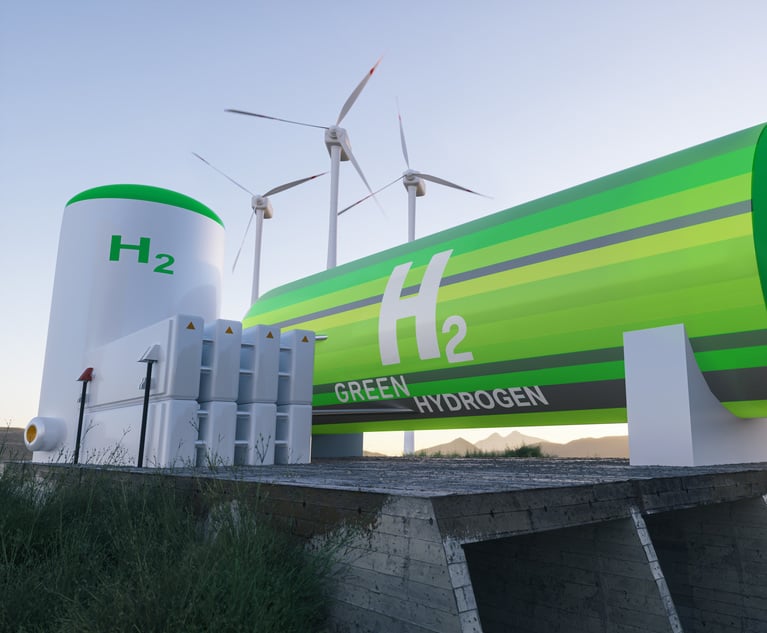 Nihat Dursun/iStockphoto
Nihat Dursun/iStockphotoSRA Hosts First Access-to-Justice Tech Competition
The Solicitors Regulation Authority and nonprofit Nesta launched a legal tech challenge to address the access the justice gap for everyday citizens and small businesses in England and Wales.
May 30, 2019 at 09:30 AM
3 minute read
The original version of this story was published on Legal Tech News
While legal technology is being leveraged by more law firms and being taught to more law students in the U.K., observers say those solutions are mostly geared toward commercial law and not the legal needs of the country's citizens and small businesses.
The Legal Access Challenge, a new legaltech challenge launched by nonprofit Nesta in partnership with the Solicitors Regulation Authority (SRA), is looking to change that. The competition, which started on Wednesday, seeks to encourage access-to-justice legaltech development in the country.
Those with early- or proof-of-concept-stage solutions can submit an application until August 11 on the competition's website. The judging panel, which will consist of individuals with entrepreneurial, technology, regulatory and access-to-justice experience, will pick four finalists. Nesta noted that the names of the judges will be published online after the application deadline closes.
In September, Nesta will also name the finalists and give them £50,000 ($63,000) each and assistance to help bring their product to market. Nesta Challenges' head of better markets Chris Gorst noted that the assistance provided hasn't been specified. The winner is scheduled to be announced in March or April 2020 and will receive an additional £50,000 ($63,000).
Applicants will be judged on the "impact that solution will have on people or small businesses, evidence the team is capable of creating the solution and [their ability to] get it into peoples' or small businesses' hands", Gorst said. Additionally, solutions will also be judged by their level of innovation in U.K. legal services.
The Legal Access Challenge marks the first legal technology competition for Nesta and the SRA, which regulates solicitors in England and Wales. The SRA said the challenge represents the regulator's broader goal of ensuring solicitors meet its standards and to help the agency evolve to resolve legal challenges.
"Our job is to make sure that everyone can trust that solicitors and law firms meet the high standards we all expect, as well as creating an environment that can offer people affordable, accessible legal services," said SRA chair Anna Bradley. "But I know that far too many people and small businesses can't get legal help when they need it, so they can't defend or enforce their rights."
Indeed, according to a survey released by Nesta Challenges, 58% of citizens in Wales and England said the legal system is not set up for ordinary people. What's more, 68% said high cost, followed by the uncertainty of the cost (56%) and knowing who to trust (37%), were key barriers to legal access for English and Welsh citizens.
That perception, Nesta said, was its reasoning for partnering with SRA and hosting the Legal Access Challenge.
The challenge also seeks to bring together a community of organisations that share an interest in innovating legal services for consumers and small businesses, Gorst added. Additionally, Nesta will work with the SRA to identify any regulatory barriers that are impeding innovations to address legal gaps.
While Nesta will handle the day-to-day activities of the challenge, the SRA's £700,000 ($882,686) grant from the U.K. Government's Regulators' Pioneer Fund, which it received in 2018, is being used to finance the challenge's rewards.
This content has been archived. It is available through our partners, LexisNexis® and Bloomberg Law.
To view this content, please continue to their sites.
Not a Lexis Subscriber?
Subscribe Now
Not a Bloomberg Law Subscriber?
Subscribe Now
NOT FOR REPRINT
© 2024 ALM Global, LLC, All Rights Reserved. Request academic re-use from www.copyright.com. All other uses, submit a request to [email protected]. For more information visit Asset & Logo Licensing.
You Might Like
View All


Doctors and Scientists Lead Climate Protests at Each Magic Circle Firm

Trending Stories
Who Got The Work
Michael G. Bongiorno, Andrew Scott Dulberg and Elizabeth E. Driscoll from Wilmer Cutler Pickering Hale and Dorr have stepped in to represent Symbotic Inc., an A.I.-enabled technology platform that focuses on increasing supply chain efficiency, and other defendants in a pending shareholder derivative lawsuit. The case, filed Oct. 2 in Massachusetts District Court by the Brown Law Firm on behalf of Stephen Austen, accuses certain officers and directors of misleading investors in regard to Symbotic's potential for margin growth by failing to disclose that the company was not equipped to timely deploy its systems or manage expenses through project delays. The case, assigned to U.S. District Judge Nathaniel M. Gorton, is 1:24-cv-12522, Austen v. Cohen et al.
Who Got The Work
Edmund Polubinski and Marie Killmond of Davis Polk & Wardwell have entered appearances for data platform software development company MongoDB and other defendants in a pending shareholder derivative lawsuit. The action, filed Oct. 7 in New York Southern District Court by the Brown Law Firm, accuses the company's directors and/or officers of falsely expressing confidence in the company’s restructuring of its sales incentive plan and downplaying the severity of decreases in its upfront commitments. The case is 1:24-cv-07594, Roy v. Ittycheria et al.
Who Got The Work
Amy O. Bruchs and Kurt F. Ellison of Michael Best & Friedrich have entered appearances for Epic Systems Corp. in a pending employment discrimination lawsuit. The suit was filed Sept. 7 in Wisconsin Western District Court by Levine Eisberner LLC and Siri & Glimstad on behalf of a project manager who claims that he was wrongfully terminated after applying for a religious exemption to the defendant's COVID-19 vaccine mandate. The case, assigned to U.S. Magistrate Judge Anita Marie Boor, is 3:24-cv-00630, Secker, Nathan v. Epic Systems Corporation.
Who Got The Work
David X. Sullivan, Thomas J. Finn and Gregory A. Hall from McCarter & English have entered appearances for Sunrun Installation Services in a pending civil rights lawsuit. The complaint was filed Sept. 4 in Connecticut District Court by attorney Robert M. Berke on behalf of former employee George Edward Steins, who was arrested and charged with employing an unregistered home improvement salesperson. The complaint alleges that had Sunrun informed the Connecticut Department of Consumer Protection that the plaintiff's employment had ended in 2017 and that he no longer held Sunrun's home improvement contractor license, he would not have been hit with charges, which were dismissed in May 2024. The case, assigned to U.S. District Judge Jeffrey A. Meyer, is 3:24-cv-01423, Steins v. Sunrun, Inc. et al.
Who Got The Work
Greenberg Traurig shareholder Joshua L. Raskin has entered an appearance for boohoo.com UK Ltd. in a pending patent infringement lawsuit. The suit, filed Sept. 3 in Texas Eastern District Court by Rozier Hardt McDonough on behalf of Alto Dynamics, asserts five patents related to an online shopping platform. The case, assigned to U.S. District Judge Rodney Gilstrap, is 2:24-cv-00719, Alto Dynamics, LLC v. boohoo.com UK Limited.
Featured Firms
Law Offices of Gary Martin Hays & Associates, P.C.
(470) 294-1674
Law Offices of Mark E. Salomone
(857) 444-6468
Smith & Hassler
(713) 739-1250









